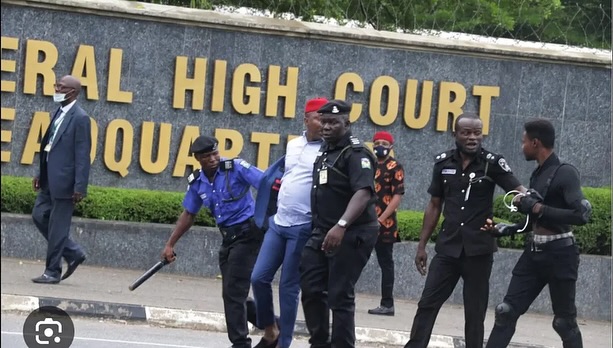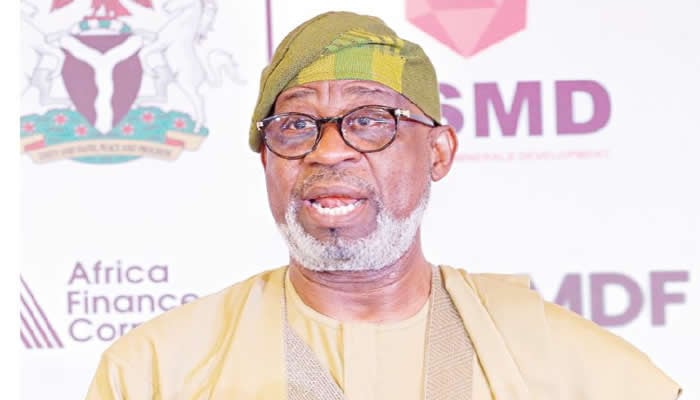When Omoyele Sowore, the publisher of Sahara Reporters and activist, announced a protest in Abuja for the release of Nnamdi Kanu, few expected it to draw such a heavy-handed response from the Nigerian government. Yet, on October 20, when the protest was scheduled to be held, the police descended on the protesters as if they were enemies of the state. The sight of armed officers arresting citizens who were simply exercising their constitutional right to peaceful protest sent a disturbing message: Nigeria’s space for free expression is shrinking fast.
That this happened under President Bola Ahmed Tinubu’s watch makes the event even more disappointing. For decades, Tinubu stood as one of Nigeria’s most vocal opposition figures. He fought military dictatorship, demanded democracy, and benefited immensely from the freedoms that civil society and the media struggled to secure. Even as a governor, he opposed the presidency of Olusegun Obasanjo and gained the sympathy of most Nigerians. As an opposition leader of the APC, he led protests against the presidency of Goodluck Jonathan. To see his government now turning against those who dare to speak or march peacefully is both ironic and painful.
The use of excessive force against peaceful protesters is not new in Nigeria. From the #EndSARS movement in 2020 to other smaller demonstrations, the APC administration has increasingly treated dissent as a crime. In the case of Muhammadu Buhari, his background as a military person and a dictator made it easier to understand. But for Tinubu, who has never been a military person and was a vocal opposition leader for decades, it has been disappointing.
What stands out in this case is the hypocrisy of those in power. The ruling All Progressives Congress rode to power on promises of freedom, reform, and respect for citizens’ rights. Many of its leaders, like Tinubu, Senator Adams Oshiomhole, and Hon. Femi Gbajabiamila, participated in protests and spoke passionately about the importance of free speech and accountability.
Now, when ordinary citizens use the same democratic tools, the state responds with intimidation and arrests. This is not the democracy Nigerians were promised.
Every democracy recognises the right to protest as a key pillar of freedom. It is not a favour granted by the government. In Nigeria’s 1999 Constitution, freedom of expression, association, and peaceful assembly are clearly protected. Citizens do not need permission to voice their concerns.
I don’t need to agree with Sowore’s views. But it is his right to organise a protest. It is the right of Nigerians to choose whether to join the protest or not. The duty of the police is to be present to monitor the protest and ensure that hoodlums don’t hijack it.
When people like Sowore and others gather to demand justice or call attention to issues, they are not committing a crime. They are simply practising democracy by holding leaders accountable. A confident government that truly believes in its legitimacy should not feel uncomfortable with peaceful protests. Instead, it should listen, engage and respond with maturity. Using threats and excessive force against unarmed, peaceful protesters is the hallmark of a dictatorship. If a government spokesperson had addressed the protesters, that would have taken the wind out of the sails of the protest.
Tinubu’s rise to prominence came through his activism and opposition to military rule. As a member of the National Democratic Coalition in the 1990s, he fought for democracy and free expression. Those were noble struggles, and history rightly remembers Tinubu and his colleagues as heroes of democracy.
But history also judges what leaders do when they gain power. The measure of a true democrat is not how loudly he demands freedom when he is out of power, but how much of that freedom he protects when he is in power. By that measure, the Tinubu government’s record so far is worrying.
It is noteworthy that Sowore’s protest went beyond Nnamdi Kanu; it also highlighted the government’s double standards. On one hand, the government negotiates with bandits who come to meetings with guns and rocket launchers; on the other hand, the government arrests and detains those who protest with no weapons.
Kanu, the leader of the Indigenous People of Biafra, has been detained since June 2021. He is facing trial on charges of treasonable felony and terrorism-related offences. Many Nigerians disagree with his methods and his vitriol. However, they believe he deserves a fair and speedy trial. Keeping him in detention indefinitely and refusing to obey court orders on him only deepens resentment and fuels division.
Sowore has positioned himself as a symbol of resistance against government excesses. The government has played into his hands by displaying intolerance. He has been arrested multiple times since 2019 for leading protests, yet he continues to speak up. Whether one agrees with his politics or not, his courage in the face of repression reflects the stubborn spirit of Nigerians who refuse to be silenced.
A government that hates dissent or crushes it loses moral authority. It portrays the government as insecure. The strength of any democracy does not lie in how it treats those who agree with it, but in how it treats those who disagree. When the government sees every critic as an enemy, it creates fear rather than loyalty.
Nigeria is already facing enormous challenges, which include economic hardship, insecurity, youth unemployment, and declining trust in public institutions. Silencing dissent will not solve these problems. On the contrary, it will worsen them. Citizens who cannot speak will find other, less peaceful ways to express their anger.
When the APC came to power in 2015, many Nigerians hoped for a new era of accountability and freedom. The party’s leaders criticised the previous government for corruption and intolerance. Yet, after over a decade in power, the APC has become worse than what it once opposed.
Under Tinubu, there was hope for renewal, given his history as a pro-democracy activist. But the early signs suggest a continuation of the same authoritarian tendencies that marked the Buhari years. The clampdown on protests, the arrests of journalists, the disregard for the Constitution in the declaration of a state of emergency in Rivers State, and the rising fear among citizens to speak freely point to a democracy that is losing its soul. Today, the separation of powers that should exist among the legislature, executive and judiciary has vanished.
Although President Tinubu seems focused on securing a second term by all means necessary, there is still time to change his attitude toward dissent. Nigerians are easy to satisfy. Saying the right words and carrying out the right actions will easily see millions of opponents move to his side. Umaru Yar’Adua achieved it by acknowledging that the election that brought him in was faulty and showing the people that he was on their side. Tinubu can start by instructing security agencies to respect the rights of protesters and journalists. It is also crucial to release those detained for peaceful demonstrations and allow citizens to express themselves without fear.
Nigeria suffered for decades under a dictatorship. In 1999, it celebrated its return to civilian rule. This is not the type of democracy Nigerians fought for. Nigeria deserves a government that listens and not one that fears its people. True democracy is not about silencing the crowd and pressuring every opponent to become a supporter. It is about hearing the cry of the people and taking steps to stop the cry.
X: @BrandAzuka






































